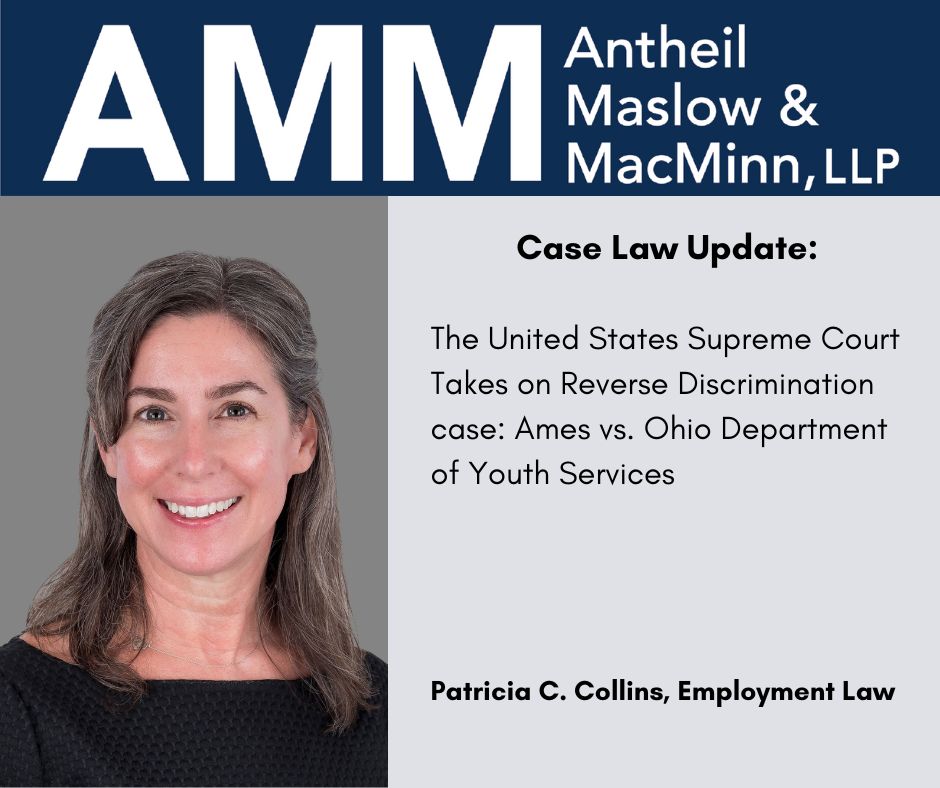Reprinted with permission from the October 14th edition of The Legal Intelligencer. (c) 2024 ALM Media Properties. Further duplication without permission is prohibited.
On October 4, 2024, the United States Supreme Court granted certiorari to hear Ames v. Ohio Department of Youth Services, a case from the United States Court of Appeals for the Sixth Circuit. The Plaintiff in Ames alleged discrimination on the basis of her membership in a majority group – that is, Ames is what has come to be known as a “reverse discrimination” case. The case will resolve a split in the circumstances regarding the evidence required for an employee to make a prima facie case of “reverse discrimination”, and could require employers to reevaluate their diversity, equity and inclusion programs.
Mariam Ames is a straight woman, who was employed by the Ohio Department of Youth Services as an administrator. Ms. Ames applied for a promotion and was told during her interview process that she should retire. After the interview, Ms. Ames was demoted, and a gay male was hired to fill her administrator position. A gay woman was hired to the position for which Ms. Ames sought a promotion. Ms. Ames claimed that the Ohio Department of Youth Services discriminated against her on the basis of her sexual orientation. The United States District Court for the Southern District of Ohio granted the employer’s motion for summary judgment, finding that Ames had not shown the “background circumstances” necessary to support a prima facie case that the employer discriminated against a member of the majority group. The court applied the burden-shifting analysis in McDonnell Douglas Corp. v. Green, 411 U.S. 792 (1973), as courts do in all discrimination cases. The Sixth Circuit affirmed, citing its previous holdings that require reverse discrimination plaintiffs to make an additional showing to the McDonnell Douglas prima facie case. Not only was Ames required to show the “usual” prima facie elements, she must also show “background circumstances” to support a reverse discrimination claim. The Sixth Circuit noted that Ms. Ames easily made a prima facie case: her claim was based on sexual orientation, a protected class under Title VII; she was demoted from a position for which she was qualified; and she was replaced by a gay man. But, according to the Sixth Circuit, the case “foundered” on Ms. Ames’ failure to show the required “background circumstances”. The Sixth Circuit noted that reverse discrimination plaintiffs generally meet this “additional” burden, in the absence of direct evidence, by presenting evidence that a member of the relevant minority group made the decision at issue, or that there is statistical evidence of a pattern of discrimination by the employer against members of the majority group. The Supreme Court granted certiorari, and the case will be heard in the upcoming term.
The Sixth Circuit’s recitation of the “background circumstances” test marks a split in the circuits. The Third Circuit rejected the “background circumstances” test in Iadimarco v. Runyon, 190 F.3d 151 (3d Cir. 1999). The Third Circuit held in that case that in reverse discrimination cases a plaintiff can show a prima facie case in the absence of direct evidence of discrimination by presenting sufficient evidence to allow a reasonable factfinder to conclude, given the totality of the circumstances, that the employer treated the majority-group plaintiff less favorably than others because of the employee’s race, color, religion, sex or national origin.
The District of Columbia (the author of the “background circumstances” test for a prima facie reverse discrimination case), and the Seventh, Eighth and Tenth Circuits have all adopted the “background circumstances” test as set out by the Sixth Circuit in Ames. The Third Circuit and Eleventh Circuits have expressly rejected this test. The balance of the circuits do not apply the “background circumstances” test to their analysis of reverse discrimination cases.
The Supreme Court will likely use Ames to resolve the split in the circuits. The Supreme Court decision in Bostock v. Clayton County Georgia may provide some guidance, and certainly had an impact on the Ames case. In Bostock, decided in 2020, the Supreme Court held that Title VII’s prohibition against discrimination on the basis of sex also barred discrimination on the basis of sexual orientation and gender identity. The Supreme Court’s opinion relied on the text of the statute in reaching this conclusion. As a result of Bostock, Ames’ claims of (reverse) discrimination on the basis of her sexual orientation fall within the protections of Title VII. However, to the extent Bostock presages a text-based analysis of the statute, it seems unlikely that the “background circumstances” test will survive.
Should the Supreme Court reverse the Sixth Circuit, it is unclear what test will apply for a reverse discrimination plaintiff to meet his or her burden to make a prima facie case in the absence of direct evidence. The Third Circuit’s test, which is closer to a more traditional McDonnell Douglas analysis, may provide some guidance. Notably, in the Iadimarco case, the Third Circuit held that disputes of material fact barred summary judgment, and noted the subtleties in interpreting the facts regarding the hiring of white and non-white employees. One could envision a fact pattern where the very existence of such a program would be held out as evidence of discrimination sufficient to support a prima facie case.
Wherever the Supreme Court lands, employers should prepare for challenges to diversity and inclusion initiatives should the Supreme Court reverse Ames and announce a new standard for reverse discrimination cases. As always, employers should focus on qualifications for the position.
Patricia Collins is a Partner and Employment Law Chair with Antheil Maslow & MacMinn, LLP, based in Doylestown, PA. Her practice focuses primarily on employment, commercial litigation and health care law. Patricia Collins can be contacted at 215.230.7500 ext. 126.

